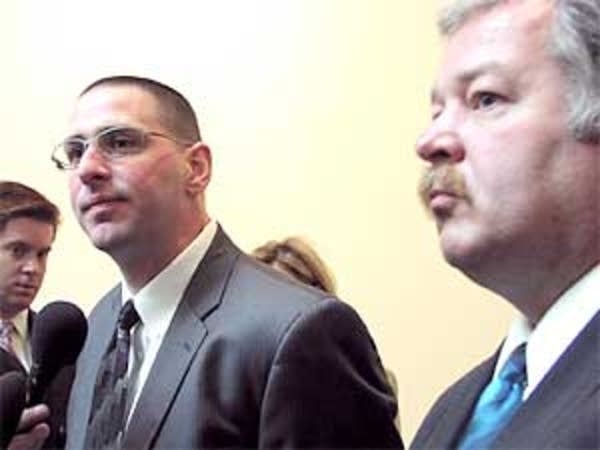State Supreme Court takes on tobacco fee case
Go Deeper.
Create an account or log in to save stories.
Like this?
Thanks for liking this story! We have added it to a list of your favorite stories.

When the state settled its landmark lawsuit seven years ago, it agreed to release the industry from future claims over smoking-related health care costs. In return, the tobacco companies agreed to pay the state billions of dollars. The state Finance Department says the tobacco companies have paid the state about $2.25 billion.
During the divisive legislative session last year, legislators passed what the governor called a health impact fee that earmarked money for smoking-related health care costs. The tobacco companies said they already pay for those costs through their settlement with the state. They contend the state is double-dipping.

Tobacco attorney Stephen Patton told justices that the state should abide by its contract. "It was a release of any claim of any nature of liability whatsoever with respect to reimbursement for health care costs, not only those that might be the result of wrongdoing, any type of claim for that," Patton said.
But Patton's statements drew questions from a lively bench. All justices asked questions, which is unusual. Patton drew the brunt of the sharp questioning. Several justices, including Chief Justice Russell Anderson, focused on the Legislature's general authority to tax regardless of the settlement.
Turn Up Your Support
MPR News helps you turn down the noise and build shared understanding. Turn up your support for this public resource and keep trusted journalism accessible to all.
"Is there any question that at the time this settlement agreement was entered into, the state was empowered to increase the tax on cigarettes? I mean it could have done that the next day. Do you agree with that?" Anderson asked.
"I do if it was a general excise tax," Patton replied. "If it were not something that fell within the subject matter of the underlying lawsuit and the express and unambiguous terms of the release, then it wouldn't be released."
Justice Alan Page then posed the scenario that if the court stuck down the fee, the Legislature could come back the next day and pass another fee as long as it didn't carry the health impact label.
Patton said that would not violate the agreement. "If it's not trying to undo the bargain it entered into then it has free reign to act."
"Then I guess I'm having a difficult time seeing what's the harm here," Page said.
"Well the harm, your honor, is a deal is a deal and that's a fundamental principle that should apply whether it's a private party to a contract or the state... When governor Pawlenty announced this, he asserted that the 75 cents was pegged to the cost of this product on the state of Minnesota," Patton said.
Attorney Karen Janisch, who represented the governor's office, told justices that the health impact fee does not violate the 1998 settlement and the state is adhering to its side of the bargain. At stake in each biennium is $400 million. She says when then-Attorney General Skip Humphrey signed the agreement with the tobacco companies, his office didn't have the authority to sign away all future fees on the industry.
"The state of Minnesota, as this contract is defined, is the state of Minnesota by and through the attorney general. If they wanted authority outside the scope of the attorney general's authority, then they had to get that through legislative action. So I think they did get exactly what the benefit of the bargain is," she said.
The state imposed the fee on cigarette distributors, but in most cases that fee was passed on to consumers.
Current Attorney General Mike Hatch is running for governor and has said the governor's fee is really a tax. The governor called it a fee to skirt a no-new-taxes pledge, according to Hatch. All the attorneys seemed to agree that whether the charge is actually a fee or a tax, made no difference.
Assistant Attorney General Brad Delapena also argued that as a tax, the attorney general's office under Skip Humphrey didn't have the power to bind the Legislature's taxing authority. Moreover, he said the settlement's release of all claims, meant claims not legislation.
"The state simply wasn't sitting at the table surrendering legislative power. Because legislative power was not within the compass of the agreement the imposition of legislation even for health care costs does not breach or impair the agreement, it is simply beyond the scope of the agreement," he said.
The justices must decide whether to uphold Ramsey County Judge Michael Fetsch's ruling from last December. He called it a fee in part because the Legislature passed a tax bill that same day and the health impact fee was in another bill. In addition, Fetsch said the settlement language was clear: the state released the companies from "liabilities of any nature, whatsoever" including those of a statutory nature."
Nevertheless, House Republicans announced Monday that if the state Supreme Court upholds the 75-cents-a-pack increase, they want to send homeowners property tax rebates this October. Those rebates would amount to about $200 each or 10 percent of a homeowner's property tax bill. If justices, strike down the fee, the lawmakers say the state won't have the money for a rebate.
The state Supreme Court has no set limit on when it rules on a case. Nevertheless, the justices do try to rule sooner rather than later particularly on cases that involve elections or the state budget.




